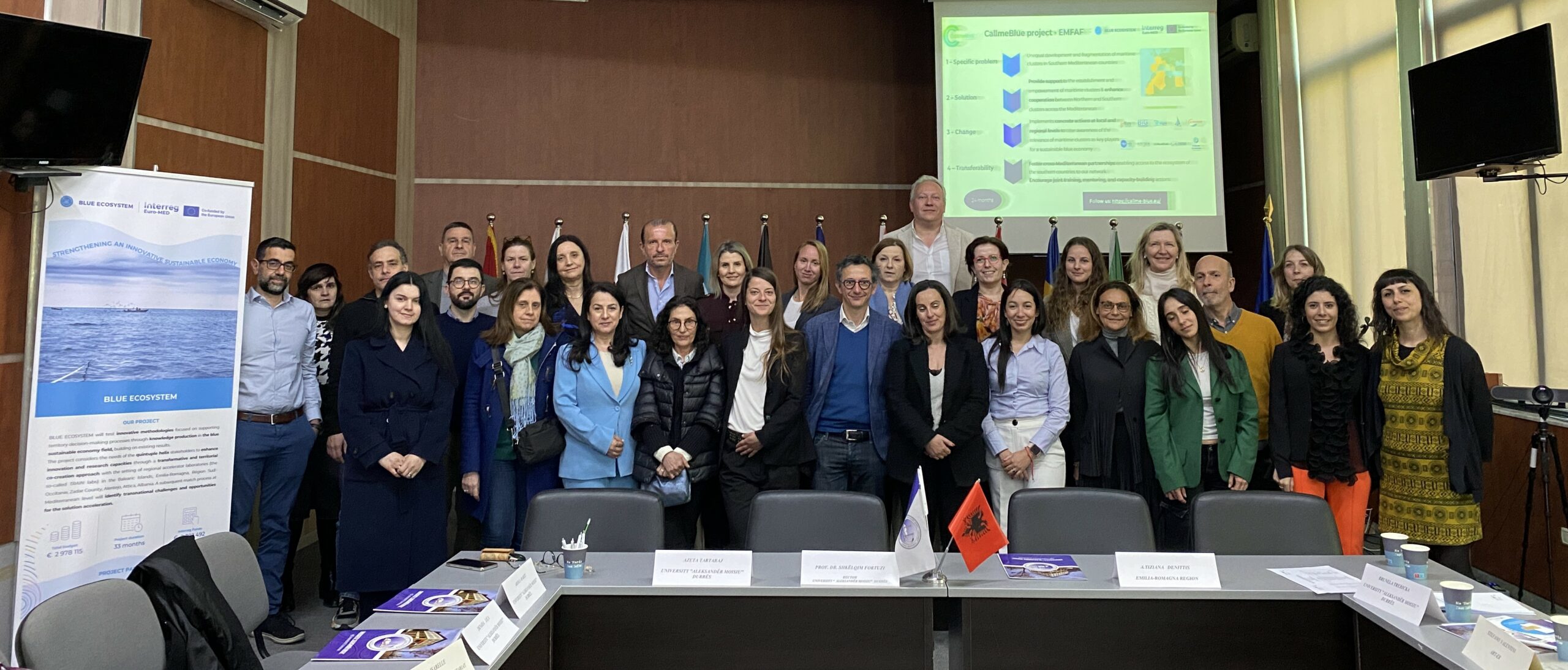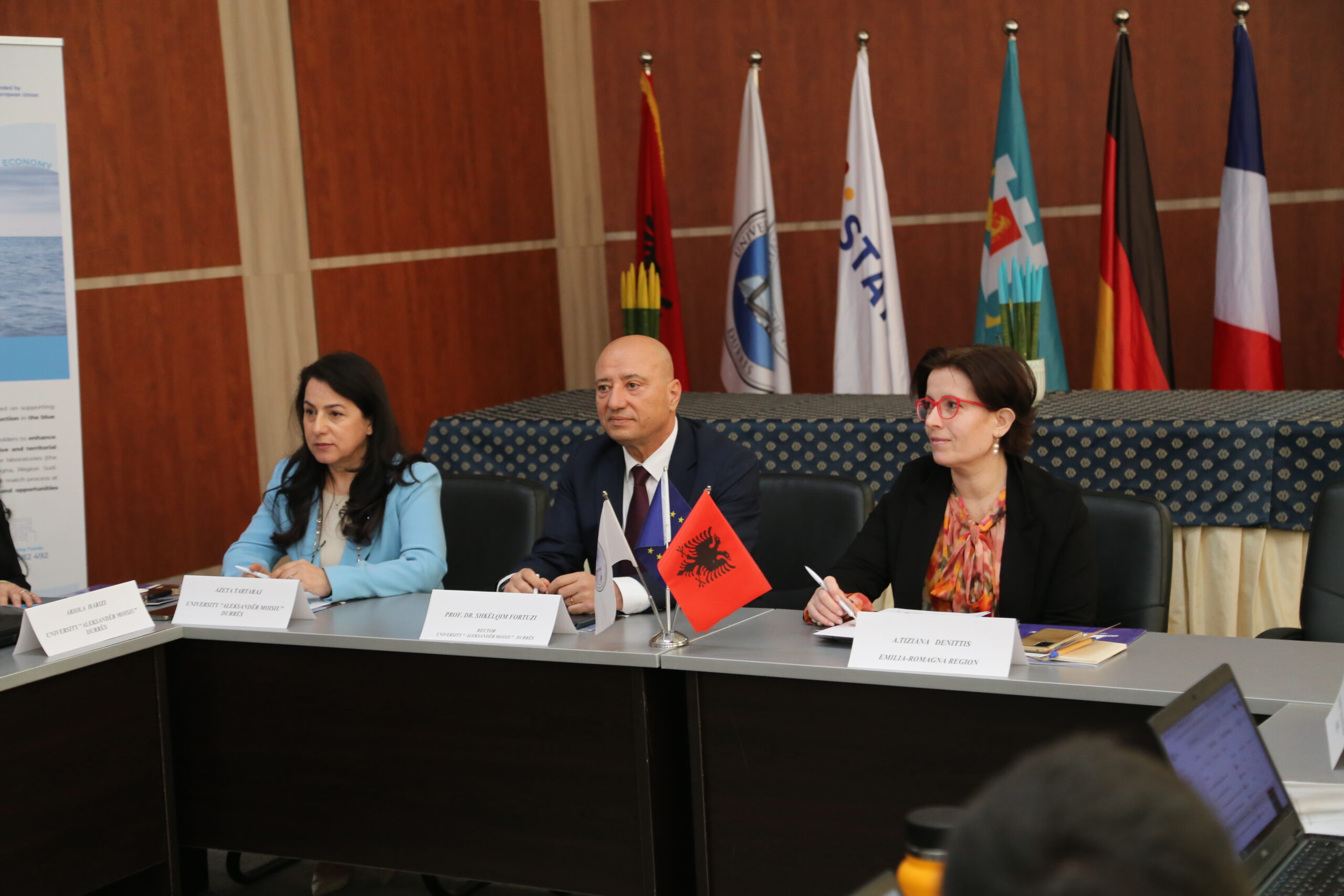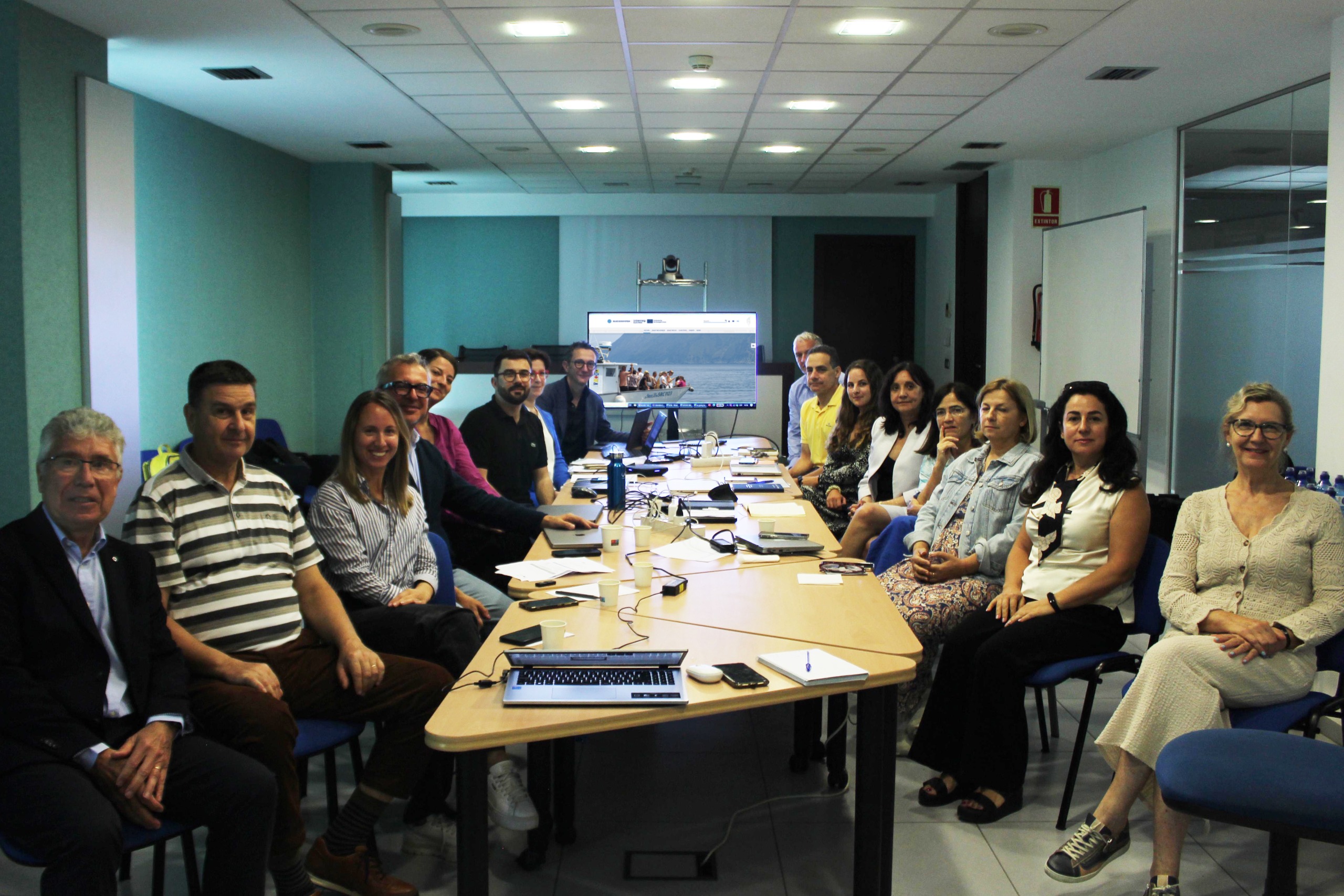Last 8 and 9 April, the BLUE ECOSYSTEM project partners and associated gathered in Durrës (Albania) for a key project meeting. A total of 42 people (including online participants) met in this Balkan country to discuss the status of the project activities and to build synergies towards a sustainable and shared blue economy.

Throughout 2024, each region hosted co-creation and co-design workshops with key local stakeholders—including policymakers, academia, civil society, industry and conservation actors—to identify major regional challenges related to the blue economy. These challenges were categorized based on a matrix arising from one of the project’s core deliverables (Blue Transformation challenges at MED level and priority matrix).
To recall briefly the challenges per region:
Alentejo
- Cultural and creative industries: promote eco-sustainable tourism by shifting from mass tourism to community-based coastal experiences, investing in digital transformation, sustainable mobility, and maritime heritage
- Bioeconomy – Agrofood: protect biodiversity and enhance food security through sustainable aquaculture, alternative proteins, biodegradable gear, and valorisation of marine by-products
- Transport and logistics: electrify ports, develop green ship design and smart logistics, and adopt alternative fuels—positioning the Port of Sines as a blue innovation hub.
- Energy: expand marine renewables such as offshore wind, solar, wave energy, and green hydrogen, supported by infrastructure investments.
Balearic Islands
- Bioeconomy – Agrofood: conserve biodiversity and achieve carbon neutrality through Marine Protected Areas (MPAs), low-impact fishing, and incentives for high-quality local seafood.
- Energy: reach carbon neutrality by scaling offshore wind and solar energy, developing green fuels like hydrogen and wave energy, and fostering stakeholder collaboration.
- Cultural and creative industries: promote eco-friendly tourism, digital transformation in hospitality, and community-led sustainability initiatives.
Occitanie & Région Sud
- Transport and logistics: improve water management in ports through quality monitoring, wastewater treatment and reuse, freshwater production technologies, and integrated digital tools to support better decision-making.
Emilia-Romagna
- Bioeconomy – Agrofood: protect biodiversity and support circular economy practices through sustainable aquaculture, regenerative methods, and the creation of MPAs.
- Energy sector : promote the transition to marine renewable energy (offshore wind and solar) and sustainable shipbuilding practices.
- Cultural and creative industries: develop eco-tourism and marine conservation, with a focus on stakeholder collaboration, digital transformation, and coastal risk management.
Zadar County
- Bioeconomy – Agrofood: enhance sustainable aquaculture, reduce waste, and develop biodegradable gear to minimize environmental impact; address Illegal, Unreported, and Unregulated (IUU) fishing through regulatory improvements and investment in R&D.
- Transport & Logistics: decarbonize ports and shipping by adopting alternative fuels, implementing smart logistics, and developing electrified port infrastructure.
- Digital Transformation: leverage AI and IoT for real-time marine monitoring, establish data-sharing frameworks, and involve citizens through science engagement initiatives.
- Environment: support marine ecosystem restoration, habitat protection, and pollution prevention using drones and AI technologies for monitoring.
- Social Innovation: promote eco-tourism, improve digital tourism platforms, and encourage community-driven conservation with green certifications and environmental stewardship models.
Albania
- Bioeconomy – Agrofood: improve sustainable fishing and aquaculture to combat overfishing and climate-induced marine degradation using AI-powered fisheries monitoring, smart aquaculture technologies, and community-led conservation.
- Energy: explore marine-based energy solutions, with a focus on offshore wind and wave energy.
- Cultural and Creative Industries: foster sustainable tourism models by integrating smart visitor management systems, enhancing community engagement, and implementing governance reforms to support eco-tourism and mitigate over-tourism impacts.
Greece
- Bioeconomy – Agrofood: enhance biodiversity and carbon neutrality in aquaculture, promote sustainable marine food systems, and develop Integrated Multi-Trophic Aquaculture (IMTA) to manage nutrient overload.
- Environment: restore marine biodiversity and combat pollution through advanced waste collection technologies and community-led habitat restoration.
- Digital Transformation: apply AI and IoT systems to improve marine resource management and address data-sharing limitations.
- Public Health: support marine biotechnology for pharmaceutical and nutraceutical applications, backed by R&D and improved regulatory frameworks.
- Energy: reduce emissions and improve efficiency by integrating wave and wind energy, along with cold ironing technologies.
Cyprus
- Transport & Logistics: move toward carbon-neutral shipping and port operations through alternative fuels, smart logistics, and digital solutions, while addressing infrastructure and regulatory gaps.
- Bioeconomy – Agrofood: foster sustainable aquaculture and fisheries with biodegradable gear, waste valorisation, and ecosystem restoration efforts.
- Energy: expand the use of marine renewable energy and invest in desalination technologies.
- Cultural and Creative Industries: promote eco-tourism, sustainable visitor management, and digital transformation in hospitality, tackling infrastructure limitations and low public awareness.
- Public Health: develop marine-derived pharmaceuticals and biotechnologies

On this occasion, the meeting focused mainly on the launch of the calls for innovative solutions with the aim of choosing and accelerate the best ideas that provide solutions to the challenges. To this end, the innovation labs or “TRAIN Labs” will be set up. The format of the Labs varies from region to region (study visits, collective technical workshops, feasibility studies, mentoring, hackathons, tailored technical support…). In fact, a section has been created in the project landing page where all the calls for innovative solutions will be published in the next weeks, stay tuned to apply.
An important point of discussion was the proposed launch of a “Blue Task Force”, promoted by the Blue Ecosystem Interreg Euro-MED project, the Interreg Euro-MED Innovative Sustainable Economy Mission, and the BlueMissionMed Horizon project, which would serve as a hinge between programmes, projects and initiatives dealing with the blue economy.
The Task Force seeks to facilitate the exchange of information on ongoing projects to ensure transparency and foster collaboration; share opportunities, insights, and key findings to enrich the collective knowledge base; promote the capitalization of results so that successful outcomes can be disseminated and scaled up; develop joint recommendations for improved and stable multi-programme coordination mechanisms based on field experience; and publish a position paper outlining the future of the sustainable blue economy in the Mediterranean and identifying key innovation challenges to address.
It will focus on governance & funding, water depollution & restoration as well as innovation in blue sectors. However, it will also have the flexibility to address more specific topics as they emerge, allowing for the creation of additional thematic areas based on evolving needs and priorities. This dynamic approach will ensure that the Task Force remains responsive and relevant in fostering a sustainable and innovative blue economy in the Mediterranean.
The calendar of potential events includes the Blue Planet Fair in Rome (7–8 May), followed by the European Maritime Day 2025 in Cork (21–23 May). The Task Force could also be presented during the General Assembly of the Intermediterranean Commission in Nice (10–11 June), and at the S3 COP Conference in Brussels (17–19 June). Finally, the initiative is expected to gain further visibility at the ECOMONDO fair in Rimini (4–7 November), an event sponsored by BlueMissionMed.
Stay tuned to BLUE ECOSYSTEM social media for real-time updates (LinkedIn or website).
For further information about the project, please contact jordi.juarez@crpm.org


